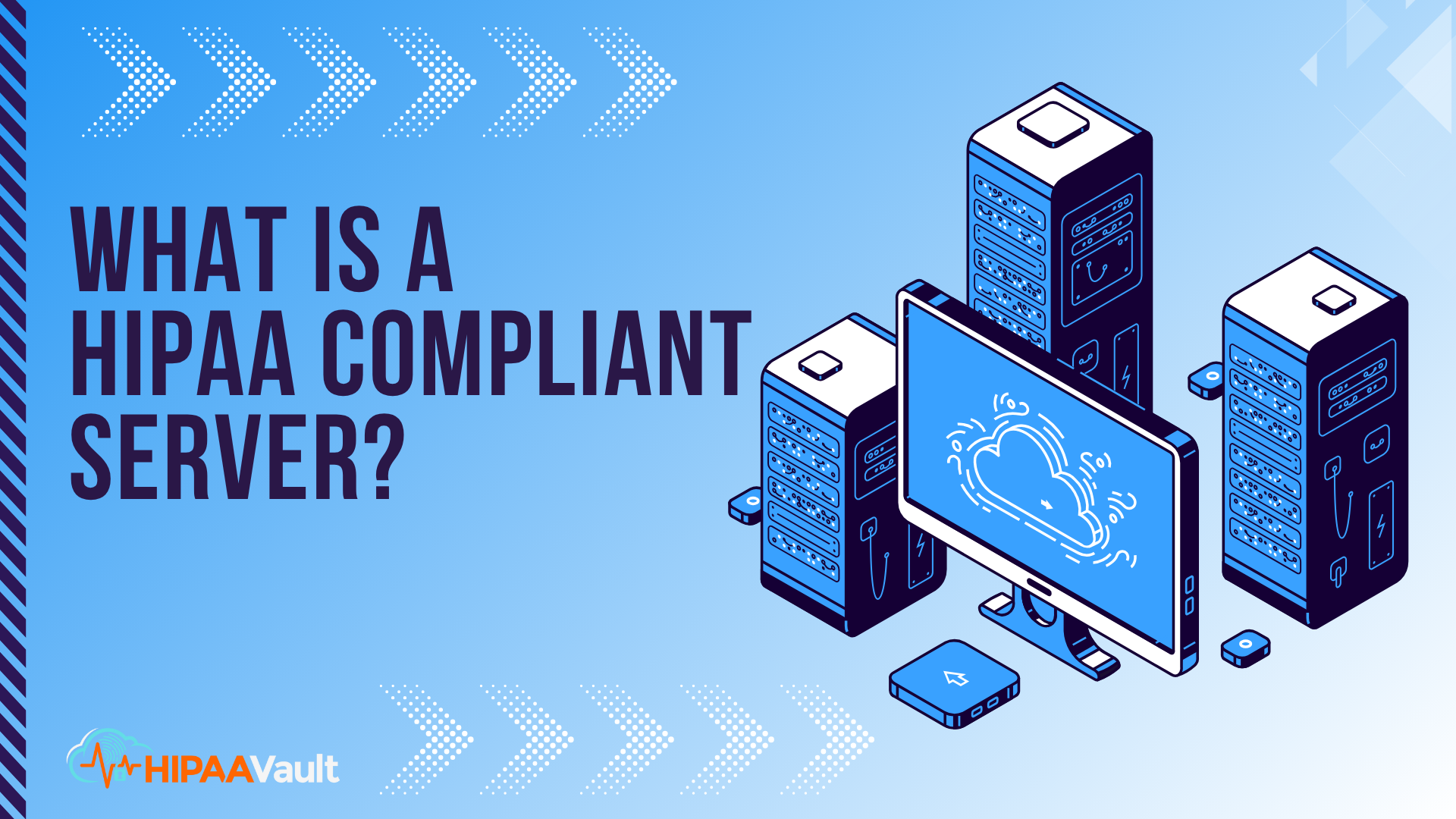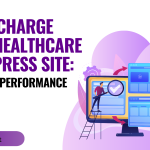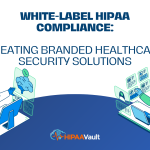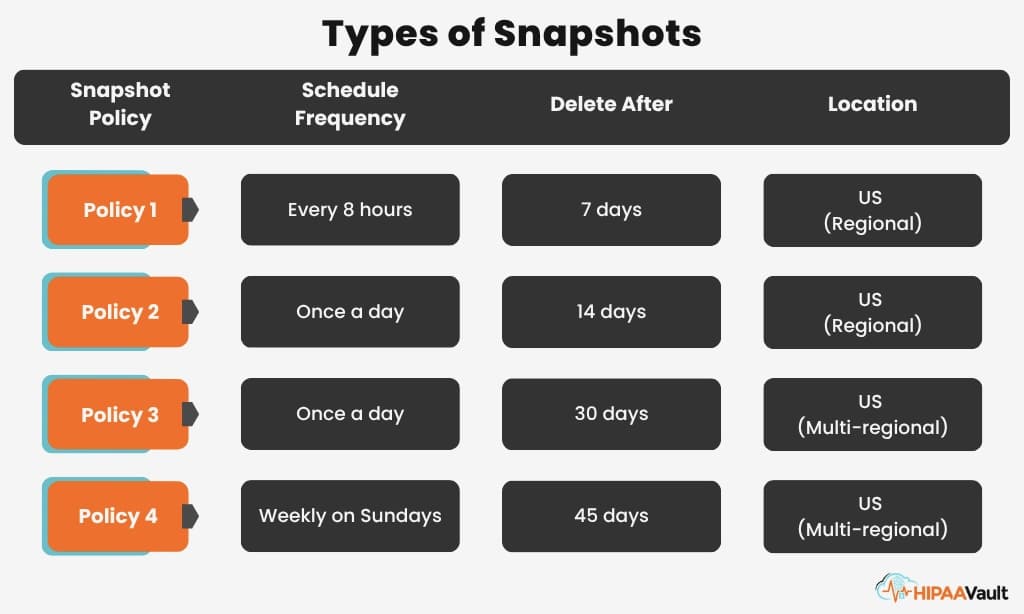As healthcare continues its digital transformation, servers have become the invisible foundation of patient portals, EHR platforms, and telehealth solutions. But unlike standard hosting environments, any server handling Protected Health Information (PHI) must adhere to the rigorous safeguards required by the Health Insurance Portability and Accountability Act (HIPAA). A HIPAA-compliant server isn’t simply a “secure” cloud—it’s an environment purpose-built to protect ePHI through technical, administrative, and physical controls.
Whether you’re a developer building a healthcare app or a health IT leader deploying clinical tools, understanding what makes a server HIPAA-compliant is critical to meeting federal regulations, protecting patients, and avoiding costly penalties. In this guide, we’ll walk through the elements of a HIPAA-compliant server, evaluate the pros and cons of cloud vs. on-premise hosting, and explain how HIPAA Vault helps healthcare organizations scale securely.
Understanding the Role of Servers in HIPAA Compliance
HIPAA applies to any system that stores, processes, or transmits electronic Protected Health Information (ePHI). That includes databases, web servers, file storage systems, and application backends. If a server touches ePHI—even indirectly—it must comply with HIPAA’s Privacy and Security Rules.
The Privacy Rule (45 CFR § 164.502) defines which uses and disclosures of PHI are permitted, while the Security Rule (45 CFR § 164.312) requires specific technical measures for protecting that data. These include access controls, audit logs, encryption, and transmission security. Simply having a secure server is not enough—its configuration, policies, and monitoring practices must align with HIPAA standards.
What Makes a Server HIPAA Compliant?
To meet HIPAA requirements, a server must implement several key safeguards. These aren’t checkboxes but interlocking controls that create a secure ecosystem for healthcare data.
One of the most emphasized technical safeguards is encryption. While HIPAA does not mandate encryption outright, it classifies it as an “addressable” implementation specification. This means covered entities and business associates must assess whether encryption is a reasonable and appropriate safeguard, and if not, document why and implement alternative measures. In practice, nearly all compliant environments now encrypt ePHI at rest (using AES‑256) and in transit (using TLS 1.2 or higher), because doing so protects data integrity and confidentiality while minimizing breach liability. The U.S. Department of Health and Human Services (HHS) recommends encryption as part of its guidance on safeguarding ePHI (HHS.gov: HIPAA Encryption Requirements).
Access control is another pillar. Each user must have a unique identifier, and access should be granted based on role. Developers don’t need access to production medical records, for example. Logging every access attempt—successful or not—is equally important. HIPAA-compliant servers are configured to create audit logs that track user activity, detect anomalies, and support forensic investigations in case of a breach.
Beyond these technical controls, administrative safeguards are essential. These include documented policies for data access, routine risk assessments, staff training, and incident response protocols. Even the most secure server won’t meet HIPAA requirements if your team lacks the procedures to manage it responsibly.
Cloud vs. On-Premises: Which is More Compliant?
The question of whether to host on-premise or in the cloud depends on control, cost, and compliance capabilities.
Cloud environments offer elasticity, lower upfront costs, and often come with built-in security and compliance support. Providers like HIPAA Vault specialize in hosting environments tailored to meet HIPAA regulations. These platforms include encrypted storage, hardened operating systems, multi-factor authentication, real-time intrusion detection, and Business Associate Agreements (BAAs) that clearly define security responsibilities.
On the other hand, on-premise servers give organizations complete control over their infrastructure. This is appealing to institutions with specific latency requirements or legacy systems. However, full control means full responsibility: organizations must manage patches, configure firewalls, conduct audits, and maintain access controls internally. Without a dedicated security and compliance team, this can be risky and resource-intensive.
Many healthcare IT teams opt for hybrid models, using cloud environments for new workloads while maintaining older systems on-premise. Regardless of the model, the core requirement remains: servers must meet HIPAA’s technical, physical, and administrative safeguards.
Avoiding Compliance Pitfalls: More than a Secure Server
A common misconception is that a server with antivirus software and a firewall is “secure enough.” HIPAA, however, demands far more. Compliance hinges on:
- Documented risk assessments: These should be performed regularly and updated as systems change.
- Signed Business Associate Agreements (BAAs): Required for any third-party vendor with access to ePHI.
- Continuous monitoring: Real-time alerts, SIEM integration, and security logs are critical to responding quickly to threats.
- Backup and disaster recovery: PHI must be regularly backed up and stored securely, with contingency plans in place for emergencies.
- Breach notification procedures: HIPAA has specific timelines and requirements for notifying patients and authorities in case of a data breach.
According to guidance from HHS and the National Institute of Standards and Technology (NIST), these measures are not optional. They’re essential for creating an environment that meets both the letter and the spirit of HIPAA (See: HHS HIPAA Security Rule Guidance and NIST SP 800‑66 Rev.1).
Why HIPAA Vault is the Right Fit
HIPAA Vault offers fully managed, HIPAA-compliant servers designed for healthcare developers, IT teams, and organizations handling ePHI. Unlike generic hosting platforms, our infrastructure includes:
- AES‑256 encryption at rest and TLS 1.3 encryption in transit
- Preconfigured role-based access controls and MFA
- Real-time log collection, SIEM integration, and 24/7 SOC monitoring
- Signed BAA covering infrastructure, monitoring, and support
- Dedicated compliance support from certified HIPAA professionals
Our mission is to let you focus on innovation—while we handle security and compliance in the background.
Learn more about our hosting options: HIPAA Vault Cloud Hosting
Conclusion: Compliance is Not a Checkbox
A HIPAA-compliant server is not simply a hardened virtual machine—it’s a foundation built with purpose, configured to protect patient data from every angle. From encryption and access control to audit logs and breach readiness, HIPAA requires a layered approach. By understanding these requirements and choosing trusted partners like HIPAA Vault, healthcare organizations and their technology partners can scale safely and confidently into the future.








